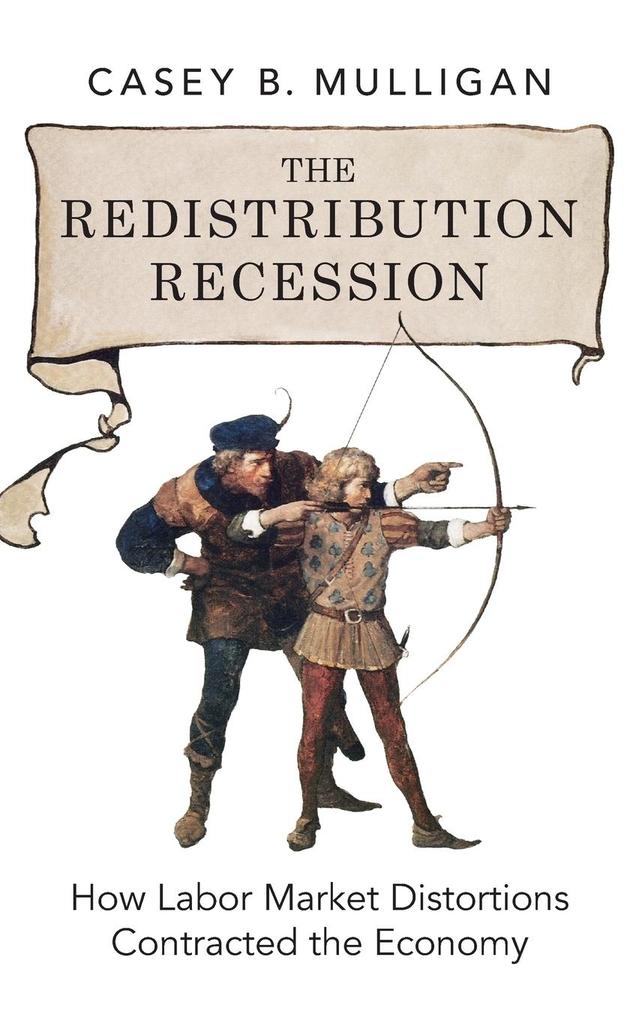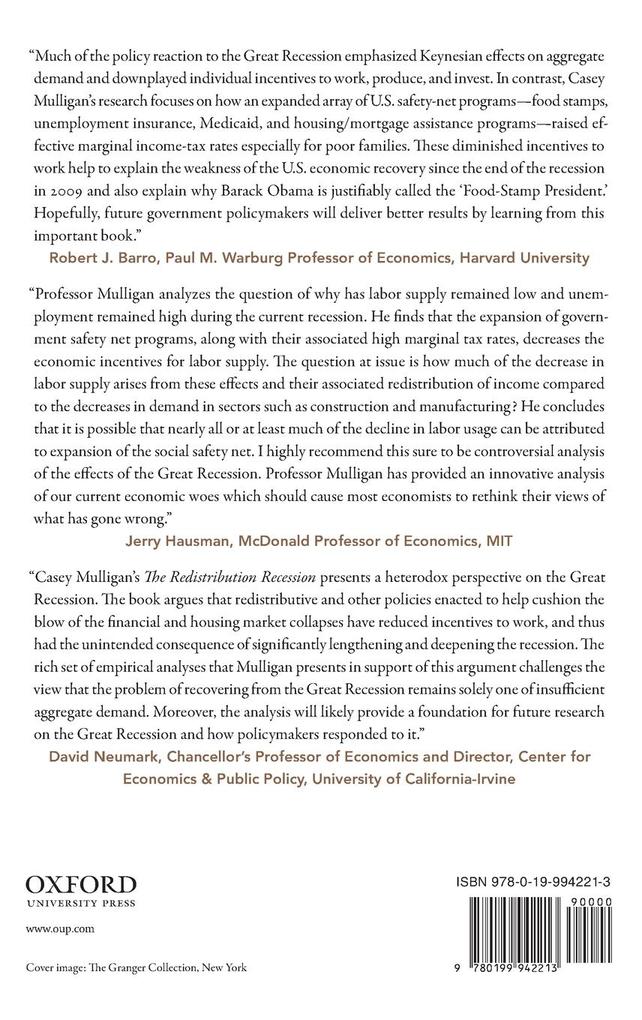
Zustellung: Fr, 11.07. - Mi, 16.07.
Versand in 2 Wochen
VersandkostenfreiBestellen & in Filiale abholen:
The Redistribution Recession is a controversial, clear-cut, and thoroughly researched analysis of the effects of various government policies on the labor market during the recent recession.
Inhaltsverzeichnis
- Preface
- Chapter 1 Introduction
- Chapter 2 The Rise of Labor Productivity
- Quarterly Indicators of Aggregate Economic Quantities
- Movements Along an Aggregate Marginal Productivity Schedule
- On Average, Real Wages did not Fall
- Was It Customer Demand? Factor Reduction and Factor Substitution by Industry
- Neither Wealth Effects nor Intertemporal Substitution Effects Explain the "Supply " Shift
- Labor Market Distortions since 2007
- Conclusion: Productivity Patterns Begin to Reveal the Recession's Causes
- Appendix 2.1: Productivity, Labor, and Residuals in Prior Downturns
- Appendix 2.2: Sensitivity Analysis
- Chapter 3 The Expanding Social Safety Net
- A Framework for Quantifying the Generosity of the Safety Net as a Whole
- Legislation Made the Safety Net Available to Millions More
- Legislation Increased the Amount of Benefits Received per Program Participant
- Most of the Increase in Government Safety Net Expenditure is the Direct Result of Program Rule Changes
- Safety Net Rule Changes and Assistance for the Unemployed
- Means-tested Loan Forgiveness
- Conclusion: Replacement Rates for Aggregate Analysis
- Appendix 3.1: Calculation and Aggregation of Statutory Eligibility and Benefit Indices
- Appendix 3.2: Sensitivity Analysis
- Appendix 3.3: The Self-Reliance Rate Outlook
- Appendix 3.4: The Making Work Pay Tax Credit
- Chapter 4 Supply and Demand: Labor Market Consequences of Safety Net Expansions
- The Income-Maximization Fallacy
- Labor and Output Effects of Safety Net Expansions
- Predictions for Consumption and Investment
- Calibrating the Wage Elasticity of Aggregate Labor Supply
- Conclusions and Interpretation
- Appendix 4.1: Comparative Advantage with Heterogeneous Effects of the Safety Net Expansions
- Appendix 4.2: Calibrating the Supply Elasticity from Unemployment Duration Studies
- Appendix 4.3: Safety Net Distortions Measured in Dollars per Year
- Chapter 5 Means-Tested Subsidies and Economic Dynamics since 2007
- The Neoclassical Growth Model with Targeted Means-Tested Subsidies
- Data and Simulation Results
- Effects of the Safety Net Expansion
- Interpreting the Residual Labor Market Distortions
- An Investment Distortion by Itself does not Fit Actual Behavior
- Conclusions
- Appendix 5.1: Calibration, Simulation, and Additional Sensitivity Analysis
- Chapter 6 Cross-Sectional Patterns of Employment and Hours Changes
- Cross-sectional Patterns of Self-Reliance Rate Changes
- Work Hours Changes by Demographic Group and Region
- Program Participation Changes by Demographic Group
- Conclusion: The Cross-Sectional Patterns of Employment and Hours Changes are as Expected from a Large Safety Net Expansion
- Appendix: Summary Statistics and Additional Results
- Chapter 7 Keynesian and Other Models of Safety Net Stimulus
- The Safety Net and Consumer Spending
- Transfers and Government Purchases are not the Same
- Labor Market Slack and the Marginal Effects of Supply
- Sticky Prices, the Wage Elasticity of Labor Demand, and the Zero Lower Bound
- An Econometric Model that Nests My Approach with the Slack Market and Sticky Price Hypotheses
- Conclusion: Whether Labor Supply Matters More, or Less, during a Recession is an Empirical Question
- Appendix: The Safety Net, Sticky Prices, and Monetary Policy
- Chapter 8 Recession-Era Effects of Factor Supply and Demand: Evidence from the Seasonal Cycle, the Construction Market, and Minimum Wage Hikes
- The Christmas and the Academic Seasons as Demand and Supply Shifts
- Christmas Demand in Recessions and Booms
- The Summer Seasonal for Employment and Unemployment
- Housing Investment Crowds Out Non-Residential Construction
- The Employment Effects of Recent Minimum Wage Hikes Were No Less than Before
- The Federal Minimum Wage Hikes Likely Reduced National Employment by Hundreds of Thousands, Especially Among the Young and Unskilled
- Conclusion: Labor Supply Still Matters, About as Much as It Did in the Past
- Chapter 9 Incentives and Compliance under the Federal Mortgage Modification Guidelines
- The Budget Set of a Borrower Facing the FDIC-HAMP Modification Guidelines
- Borrower Reactions under Full Information and Full Compliance: Spend More and Work Less
- Lender Incentives to Expand Modification Capacity
- Conclusions
- Appendix 9.1: Principal Modifications and the Eligible Income Range
- Appendix 9.2: Marginal Tax Rates with Various Horizons and Discount Rates
- Chapter 10 Uncertainty, Redistribution, and the Labor Market
- A Model of the Equity-Efficiency Tradeoff
- Possible Changes in the Equity-Efficiency Tradeoff, and the Optimal Degree of Social Insurance
- The Cost-Benefit Analysis of Safety Net Expansions: Necessary Ingredients
- Conclusions
- Chapter 11 Conclusions
- Incentives Matter
- Was the Financial Collapse a Cause, or Effect?
- Labor Supply and Demand Help Explain an Unhappy Situation
- Bibliography
Produktdetails
Erscheinungsdatum
02. November 2012
Sprache
englisch
Seitenanzahl
351
Autor/Autorin
Mulligan
Verlag/Hersteller
Produktart
gebunden
Gewicht
760 g
Größe (L/B/H)
241/161/27 mm
ISBN
9780199942213
Entdecken Sie mehr
Pressestimmen
"Much of the policy reaction to the Great Recession emphasized Keynesian effects on aggregate demand and downplayed individual incentives to work, produce, and invest. In contrast, Casey Mulligan's research focuses on how an expanded array of U.S. safety-net programs-food stamps, unemployment insurance, Medicaid, and housing/mortgage assistance programs-raised effective marginal income-tax rates especially for poor families. These diminished incentives to work help to explain the weakness of the U.S. economic recovery since the end of the recession in 2009 and also explain why Barack Obama is justifiably called the 'Food-Stamp President.' Hopefully, future government policymakers will deliver better results by learning from this important book." --Robert J. Barro, Paul M. Warburg Professor of Economics, Harvard University
"Professor Mulligan analyzes the question of why has labor supply remained low and unemployment remained high during the current recession. He finds that the expansion of government safety net programs along with their associated high marginal tax rates, decreases the economic incentives for labor supply. The question at issue is how much of the decrease in labor supply arises from these effects and their associated redistribution of income compared to the decreases in demand in sectors such as construction and manufacturing? He concludes that it is possible that nearly all or at least much of the decline in labor usage can be attributed to expansion of the social safety net. I highly recommend this sure to be controversial analysis of the effects of the Great Recession. Professor Mulligan has provided an innovative analysis of our current economic woes, which should cause most economists to rethink their views of what has gone wrong." --Jerry Hausman, McDonald Professor of Economics, MIT
"Casey Mulligan's The Redistribution Recession presents a heterodox perspective on the Great Recession. The book argues that redistributive and ot
"Professor Mulligan analyzes the question of why has labor supply remained low and unemployment remained high during the current recession. He finds that the expansion of government safety net programs along with their associated high marginal tax rates, decreases the economic incentives for labor supply. The question at issue is how much of the decrease in labor supply arises from these effects and their associated redistribution of income compared to the decreases in demand in sectors such as construction and manufacturing? He concludes that it is possible that nearly all or at least much of the decline in labor usage can be attributed to expansion of the social safety net. I highly recommend this sure to be controversial analysis of the effects of the Great Recession. Professor Mulligan has provided an innovative analysis of our current economic woes, which should cause most economists to rethink their views of what has gone wrong." --Jerry Hausman, McDonald Professor of Economics, MIT
"Casey Mulligan's The Redistribution Recession presents a heterodox perspective on the Great Recession. The book argues that redistributive and ot
Bewertungen
0 Bewertungen
Es wurden noch keine Bewertungen abgegeben. Schreiben Sie die erste Bewertung zu "The Redistribution Recession" und helfen Sie damit anderen bei der Kaufentscheidung.










